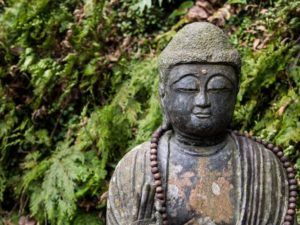The Zen Teachings of Master Lin-Chi is the recorded sayings of a Master of the Ch’an school of Buddhism, Lin-Chi. While many other branches of the Ch’an school died out, the line founded by Lin-Chi continued, making this work particularly important.
This text contains two primary themes, the hitting of and shouting at of people, and that Enlightenment cannot be sought out through texts. Lin-Chi appears to have believed that hitting and shouting could lead a person to enlightenment, the implication being that when being hit or shouted at, one is entirely in the present, with no pretensions or thoughts about Buddhism.
Such an example of this working the way Lin-Chi believed it would occur early in the text:
A monk asked, “What is the basic meaning of Buddhism?”
The Master gave a shout.
The monk bowed low.
The Master said, “This fine monk is the kid who’s worth talking to!” (Watson 9)
 The Master (Lin-Chi) gave a shout and at that moment, it is implied that the monk understood the meaning of Buddhism. The shouts and hits are immediate responses to questions and it is “this quality of immediacy of the experience that the teacher is endeavoring to convey to the student, urging the student to experience the content of enlightenment in the same sudden and immediate manner.” (Watson xxvii)
The Master (Lin-Chi) gave a shout and at that moment, it is implied that the monk understood the meaning of Buddhism. The shouts and hits are immediate responses to questions and it is “this quality of immediacy of the experience that the teacher is endeavoring to convey to the student, urging the student to experience the content of enlightenment in the same sudden and immediate manner.” (Watson xxvii)
Expressions of this form of violence are found repeatedly through the text, and it is regarded that the Ch’an school founded by Lin-Chi is one generally filled with tension and violence, even now, which does not seem surprising considering the frequency of hitting throughout the text.
Sometimes it appears as if there is no way to avoid being hit by Lin-Chi, regardless of what route of action is taken.
The Master asked a monk, “Where did you come from?”
The monk gave a shout.
The Master bowed slightly and motioned for him to sit down.
The monk was about to say something, whereupon the Master struck him a blow.
The Master saw a monk coming and held his fly whisk straight up.
The monk made a low bow, whereupon the Master struck him a blow.
The Master saw another monk coming and again held his fly whisk straight up. The monk paid no attention, whereupon the Master struck him a blow as well. (Watson 84)
Perhaps Lin-Chi’s tendency towards hitting as a form of enlightenment, and ultimately the view of the branch he founded, originates from his visit with Huang-po. He asked Huang-po “what is the real basic meaning of the Buddha-dharma?” three times. Each time Huang-po hit him. Finally, Lin-Chi concluded he must have too much bad karma to understand Huang-po. So he left. Upon Huang-po’s counsel, he went to visit Ta-yu, where he experienced enlightenment and punched Ta-yu. (Watson 104-107)
Perhaps the fact that part of his eventual enlightenment was from shouting and hitting is why that is the method he uses to teach his students.
Another example of hitting leading to enlightenment is found in an exchange between Ting and Lin-Chi. Upon asking what the basic meaning of Buddhism was,
The Master got down from his chair, grabbed a hold of him and gave him a slap. Then he let go.
Ting stood in a daze.
A monk standing nearby said, “Mr. Ting, why don’t you make a bow?”
As Ting was making a formal bow, he suddenly had great enlightenment. (Watson 97)
Meetings such as this happen with frequency within The Zen Teachings of Master Lin-Chi.
Lin-Chi also has a large focus in his talks on the fact that seeking Buddha is not the way to find Buddha. He believes that texts and phrases do nothing but hinder understanding and Enlightenment. “… students these days … seize on words and form their understanding on that basis. …they copy down the sayings of some worthless old fellow … Blind fools, what sort of juice do they expect to get out of old dried bone?” (Watson 61)
Enlightenment was intended to be something beyond description, beyond what the verbal can transcend, and therefore words were of little consequence in the search for Buddha. Lin-Chi seems to say in this text that the things preventing students attaining enlightenment were simply a lack of faith in themselves and a preoccupation with texts and the external philosophies of religion.
You must right now turn your light around and shine it on yourselves, not go seeking somewhere else. Then you will understand that in body and mind you are no different from the patriarchs and buddhas, and that there is nothing to do.” (Watson 68)
Enlightenment in the school of Ch’an, therefore, comes about when one stops looking, stops asking, stops pursuing the Buddha. Even if you have achieved enlightenment, you must not say it.
Religious practice requires no time, and what you want, you’ve already got.
It cannot be found in words or texts, but from within. “Even if they something, all it will be is words and phrases, pretty appearances. They’ll never get at the living thought of the patriarchs!” (Watson 23)
Students do not learn because they think they cannot, they think they are too different from the Masters of Buddhism, the buddhas and the patriarchs. As such, students run around trying to find the answers when the answers are already there, as referenced by the following:
 “Do you want to get to know the patriarchs and buddhas? They’re none other than the people standing in front of me listening to this lecture on the Dharma!” (Watson 23) Students must look inside themselves, “never look for something outside yourselves”, Lin-Chi says. (Watson 24)
“Do you want to get to know the patriarchs and buddhas? They’re none other than the people standing in front of me listening to this lecture on the Dharma!” (Watson 23) Students must look inside themselves, “never look for something outside yourselves”, Lin-Chi says. (Watson 24)
The idea seems to be, not to stop thinking, but to live above temptation and the elements; to do anything else is to allow a devil into your mind. Even the greatest bodhisattvas must avoid temptation such as doubt, or they become prey to the threefold world.
In conclusion, it would seem that one of primary points of The Zen Teachings of Master Lin-Chi is a consistent show of this branch of Zen Buddhism’s (Ch’an) use of violent means, such as hitting and shouting to bring students back to the present and, hopefully, lead them to the enlightenment and vision that they sought, even though what the students sought was already there inside them. In many cases throughout the book, however, this method seems to work quite well, as, soon after being hit, they seem to achieve enlightenment.
Another point of a conclusion is the fact that seeking enlightenment, in the Lin-Chi Ch’an tradition, is counter-productive to achieving it. It is something that comes from inside, and can only be found when one is not looking for it. This seems to be the main principle of Ch’an Buddhism, found throughout Lin-Chi’s lectures in the book. He maintains that the buddhas and patriarchs are the people listening to him, they just haven’t realized it yet. The listeners have not yet become enlightened, and that to join those they so revere they simply need to look within and free themselves from the constraints of the threefold world.
Works Cited: Watson, Burton. The Zen Teachings of Master Lin-Chi. New York: Columbia UP, 1999. Print.






